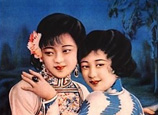
While the stage offers ample room for opera performers to show their artistic skills in singing, recitation, acting and acrobatic fighting, displaying these skills on film is more difficult. "My concept is firstly it's a Kunqu Opera, then it's a film. All the opera elements must be fully displayed in the film, and meanwhile we make use of the language of the camera to tell the story," Gong told the Global Times.
For example, at the end of the story we see Daguanyuan, the luxurious garden built for Jia Fei (the Jia family's daughter who married the emperor then fell out of favor), in desolation and decline, but "remembered" in all its splendor. Film allows viewers to more clearly see the symbolism that this garden shares with the Jia family.
"Through those comparative shots, Baoyu's thoughts for fortune, love and poverty are delivered to audiences, and meanwhile the core idea of the author Cao Xueqin, that 'life is only a dream' is also displayed in the film," said Gong.
"In a stage drama, there is only one background setting for an event, but a film can show the feelings of the character more deeply using different and specific shots," he added.
However, the film version also has its down side. Due to time restraints, some of the plot points in the original novel that many fans of the story are familiar with and interested in seeing were cut out. For example, the famous episode when "Granny Liu visits Daguanyuan (an eye-opening experience)," which was very amusing in showing Liu's awkwardness as she first enters Daguanyuan, was cut in post-production editing.
"In fact, all Granny's shots were removed due to the limited time for the film," Gong noted.
Eyeing young audiences
With all roles played by young actors from NKOT, the film partly targets a young and educated audience.
"I was interested in the book of A Dream of Red Mansions since I was little, and I've watched many of its different versions on stage and screen. Now I'm curious about what the Kunqu Opera version will be like on screen," said Wei Qian, a student from Peking University.
The premiere at Peking University kicks off the film's tour this year. According to plan, it will be mainly shown at universities both in the country and abroad.
"Next stop may be Tsinghua University, and other universities in Beijing, and then we will go to Nanjing and Shanghai where Kunqu Opera has a traditional base," Gong said.
Universities in Taiwan and Hong Kong are also high on the agenda. In February last year, when the stage version of Kunqu Opera A Dream of Red Mansions by NKOT was presented at Taiwan, the feedback from audiences was overwhelming. A similar thing happened in Paris last June when some film clips were first shown there.
"After the clips were finished, the audience there didn't leave for an hour. We were really touched that a part of traditional Chinese culture that some of our own people don't care about was so popular in France," said Gong. This year, he added, they will be showing the complete version of the film at some universities in Europe and the US.
At the same time, unlike any of the other film versions of traditional Chinese opera, this Kunqu film will officially enter commercial movie theaters at the end of this year for a fixed and long term screening.
"It will be great if we can do well at the box office, but our expectation for the film doesn't lie there," said Yang Fengyi, president of NKOT and producer of the film.
"We hope it will introduce Kunqu Opera more widely, and of course if audiences interested in Kunqu are able to go to movie theaters to watch it, that will help to support our traditional culture," she said.

















 Missing baby killed in Changchun | Photos: Local residents mourn for killed baby
Missing baby killed in Changchun | Photos: Local residents mourn for killed baby


![]()
